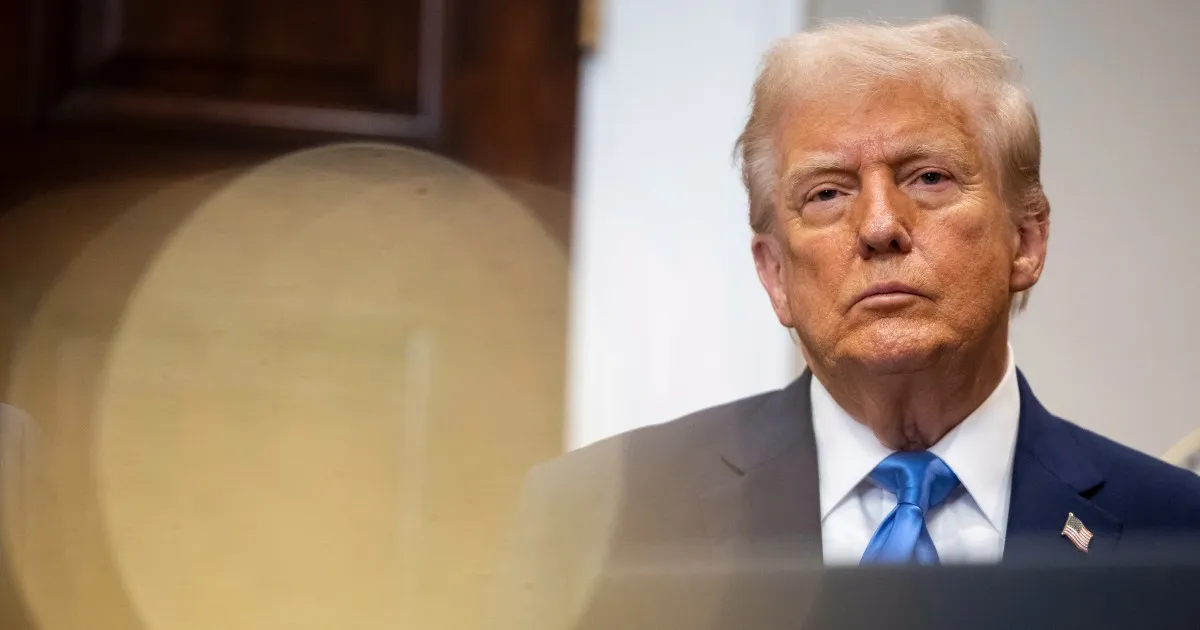
In an exclusive interview with NBC News on Sunday, President Donald Trump leveled serious accusations against former FBI Director Christopher Wray, claiming he exhibited “inappropriate” behavior during his time in office. Trump speculated that the Justice Department may be investigating Wray, stating, “I would imagine. I would certainly imagine. I would think they are doing that.” This comment came during a phone call where he was asked if the Justice Department should pursue an investigation into Wray.
Trump criticized Wray's performance, stating, “He did a terrible job and we just found out about it.” He elaborated, saying, “I think it’s very inappropriate what he did. And I think a lot of his service was very inappropriate.” The remarks followed Trump's recent claims about FBI agents allegedly being embedded in the crowds during the January 6th Capitol riot, which he described as a “hoax.”
Trump's assertion about the presence of FBI agents during the January 6th events was further fueled by a post he shared on Truth Social, where he alleged that “274 FBI Agents” were secretly placed in the crowd “against all Rules, Regulations, Protocols, and Standards.” These allegations have been repeatedly dismissed, as there is no evidence supporting the claim that undercover officers were present at the protests on that day. A report from the Justice Department’s inspector general published in December corroborated that finding.
In a contrasting narrative, FBI Director Kash Patel described the agency's role during the January 6th events, stating that agents were deployed to manage crowd control only after the riot commenced. Patel criticized the leadership for failing to adhere to FBI standards, claiming that agents were sent in after the situation escalated.
Despite Trump's accusations, Christopher Wray has yet to publicly respond to the claims. Meanwhile, a former senior FBI official dismissed the allegations made by Trump and Patel as “completely and utterly untrue,” asserting that no agents were authorized to observe crowds on January 6th.
In related news, former FBI Director James Comey was recently indicted on charges of making false statements and obstructing a congressional proceeding, which has drawn further scrutiny regarding the actions of former officials during the Trump administration.
During the same interview, Trump discussed his controversial plans to send troops to Oregon, stating he was “authorizing Full Force, if necessary,” to protect Immigration and Customs Enforcement (ICE) facilities in what he described as “War ravaged Portland.” Democratic Governor Tina Kotek promptly countered Trump’s narrative, asserting that Oregon does not need federal troops and that the city is far from being in a state of lawlessness.
Trump, however, maintains that the situation in various American cities, including Chicago, is dire, labeling it a “crime-ridden mess.” He has been vocal about his intentions to assist cities plagued by violence and crime, mentioning his administration's previous deployment of federal law enforcement officers to curb unrest in Washington, D.C., and Los Angeles.
As Trump navigates these controversies, he also faces a potential government shutdown. He acknowledged on Sunday that a shutdown is “a possibility” if an agreement is not reached with congressional leaders. Trump is set to meet with representatives from both parties to discuss a continuing resolution to avoid disruptions to government operations.
Amidst these discussions, Trump has hinted at significant layoffs of federal workers if a shutdown occurs, reinforcing his stance against funding health care for undocumented immigrants, a point of contention with Senate Democrats.
Looking ahead, Trump expressed optimism about a planned meeting with Israeli Prime Minister Benjamin Netanyahu at the White House, hoping to reach a resolution to the ongoing conflict in Gaza. He emphasized that “there is a really good chance for peace in the Middle East,” while reiterating his opposition to any annexation of the West Bank by Israel.
While details of a potential peace deal remain under wraps, Trump’s administration is hopeful about progress, with officials indicating cautious optimism about the negotiations in the region.